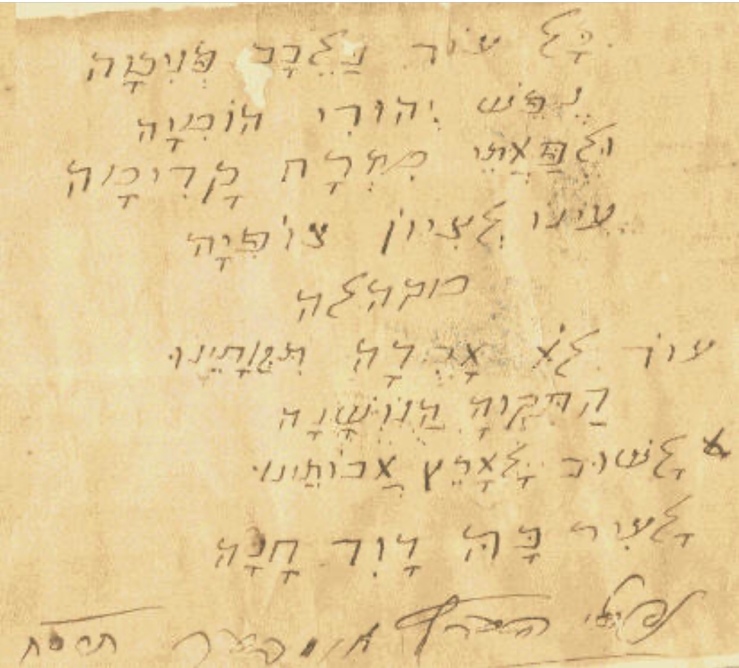Hello and welcome back! I hope that you had a wonderful Christmas and New Year’s celebration. I had a wonderful time with family and friends and getting to know old friends again. But now it is back to work and back sharing stories of the Holocaust and World War II with you.
So, a while back I was cruising through Facebook and I saw this post that said “Holocaust Survivors Sing the Hatikvah”. Now, not being Jewish myself, I had no idea what this song was and what inspired these people to sing it at such a momentous time. So, let me share with you what I have learned.

What is the Hatikvah?
Here’s what I have learned. The Hatikvah is the national anthem of Israel, however before that it was a poem written in the 1880’s by Naftali Herz Imber, a Galatian Jew. Translated to English is means “the Hope”.
The poem speaks of the eternal hope of the Jewish people to see their homeland again. In 70 C.E. Roman emperor Titus lead Roman troops into Jerusalem and sacked the city, burning parts of it to the ground and taking many Jews prisoner. For 2,000 years the Jews were exiled from Jerusalem and through it all, they longed to see their homeland again. The first stanza of the poem is a history lesson, repeating the actions of Titus and the Roman military and how the people have always had a heart felt longing to return. The second stanza speaks of the Jews undying hope that they will return once again to Israel. And it is the not the hope of one generation, but of every generation of Jew.
The Hatikvah is sung as a promise to never forget the eternal longing of the Jews hope for freedom.
That’s a very powerful song.

They Sang
In researching this post, I found four documented examples of when camp inmates defied their Nazi captor and sang.
The first one I am going to talk about is from a man called Filip Muller. Filip was a sonderkommando in Auschwitz, one of very few to survive the war. His job was to haul bodies from the gas chambers and take them to the incinerators. But one day, that changed.
He saw a group of Czech Jews arrive at the camp and as they made their way to the gas chamber, there was a low rumble at first but then one voice started singing and then another until it was a mighty chorus. They sang the Czech national anthem and the Hatikvah. This infuriated the SS, they beat the prisoners, trying to get them to stop singing, but it didn’t work. This was sort of their last-ditch effort at a protest. Filip was so moved by what he heard and saw that he tried to join them, but was pushed back. One prisoner said to him “your death won’t give us back out lives…bear witness to our suffering.”
In 1944 a young Polish Jewish pilot was shot down and taken to a camp in Silesia (southern Poland). Historians have not been able to figure out which camp this was, as there were so many in the area. His camp was near a forced labor camp, where prisoners were forced to work in inhuman freezing climates with little food and their clothes in rags. He saw approximately 300 18-25-year-old Jews and they would sing the Hatikvah to keep up their morale.
April 20, 1945 in Bergen-Belsen concentration camp, five days after liberation BBC radio broadcaster, Patrick Gordon Walker was recording for his radio program. He was recording his impressions of the camp, with the dead lying around it, looking like bones with skin. Those who could still barely walk, due to years of starvation and over work, walking to a religious service to celebrate the liberation of the camp. The survivors were aware that they were being recorded. They sang the Hatikvah. They sang it loud and strong with whatever little strength they had left, they wanted the world to hear them and know that they were still there. At the end of the service, who ever was leading it, said Am Yisrael Chai (The children of Israel still liveth).
But the incident that started all of this research is this one. In 1945, after the war had ended, a ship called “Unafraid” set sail for Israel. When it was set upon to turn back, the people on board started singing the Hatikvah. They were all Buchenwald survivors, looking to go to the only home they had left.
When ever you doubt the power of a song, think back to this. The one song that a people living through the most unimaginable horrors, sang about their homeland. They didn’t sing songs filled with hate or anger, but they sang for their longing to go home. One voice is all it takes to start a chorus.

I hope that you have enjoyed this post and that you will consider becoming a full-time follower of this blog. Join me again when we will hear more stories of hope, courage and survival during a time when there wasn’t much hope. Please feel free to share it with your friends and family via email, text or social networking. Until next time!



Just :thanks
LikeLiked by 1 person
You’re welcome.
LikeLike
Just :thanks
LikeLiked by 1 person